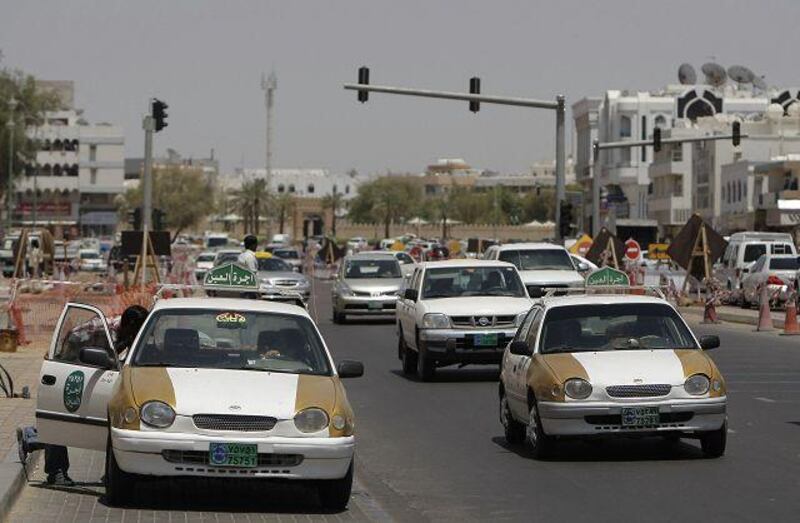AL AIN // With the city's first buses ready for roll-out before Ramadan, residents said they were looking forward to having a cheaper, safer way to get around the city. Four out of five people waiting by the road to be picked up - either by taxis or company buses - in Al Ain yesterday said they planned to switch to buses.
"For me the issue is personal safety," said Kristine Soyson, 27, a Filipina cashier at a fast food restaurant. "I would feel safer on a bus riding with other passengers than sitting alone in a taxi with a man I don't know." Francis Espanol, 27, also from the Philippines, said he would take the bus to save money. "I spend Dh150 (US$40) on taxis every month on average," he said. "The buses will be cheaper for sure but I am worried that they will not run frequently.
"If the bus comes quickly I will prefer to take it over a taxi. I am not bothered that it will stop every few minutes if it means I have more money in my pocket." However, Mohammed Shafiq, 38, a Bangladeshi mobile phone technician, said buses would be too slow for him. "Taxi prices are not too expensive. I would rather pay extra for a taxi to not have to stop every few minutes in a bus," he said.
The Department of Transport (DoT), which is registering the first orange and white Mercedes buses and preparing timetables and route maps, plans to launch the first four bus routes in two weeks, adding another four by the end of the year. Saeed al Hameli, the general manager of the DoT's public bus services, has said the buses will run between the outskirts and city centre, linking key locations such as Tawam Hospital, Al Ain Airport, Hili Park and Bawadi Mall.
The service will eventually be increased to 17 routes, with 350 buses running by 2011. Unlike bus services in Abu Dhabi, which were initially free of charge when launched a year ago, Al Ain's buses will charge from the outset. However, the city's taxi drivers said they feared that the new, cheaper option for travellers could drive them out of a job. The drivers are already dreading the impact that the addition of 1,400 taxis to the city's current 700-strong fleet by the end of the year will have on their earnings.
Now some are saying that, if business declines once the buses begin picking up passengers, as they are sure it will, they plan to quit driving and head home. Rida al Aswani, a 34-year-old Egyptian who drives for Tawasul, fears the worst. "The new buses will definitely affect us," he said. "Until now, the only way people who don't have cars had of getting around was by taxi. With buses going across from one end of Al Ain to the other, people who used to take taxis will now take the bus."
He said the bus fare, which has not been finalised but has been pegged between Dh1 and Dh10 depending on the length of trip, would be cheaper than an average cab ride. Shashi Daran, 49, from India, also drives for Tawasul. He believes the buses will have more of an effect on gold-and-white taxis than for drivers like him, who run silver taxis. "The people who take the silver taxis are not worried about spending an extra few dirhams to travel in a clean, air-conditioned taxi," he said. "It's the people who want to save money who take the gold-and -white taxis - those are the people who will take the bus. So I don't think it will affect me too much."
Salem Hassanein, 35, from Egypt, who drives for Arabia Taxi, said: "I have seen the buses being driven in Al Ain for the past couple of weeks. Although they are still out of service, I have seen people trying to flag them down. "Of course, the buses don't stop because the drivers are training, but when the service starts I think our business will suffer." Mr Hassanein plans to leave if business is hit too hard. "We barely make enough to meet the requirements set by the companies we work for," he said. "This is going to be just another burden on us."
Ghulam Shahid, 44, a Pakistani, has been driving a gold-and-white taxi in Al Ain for nine years. "The buses will definitely affect business, but I am not too worried because I am quitting this job altogether and going home by Eid," he said. "I heard that the gold-and-white taxis are being phased out next year and that more silver taxis are being added on the road, and now, with the buses, there won't be enough passengers."
ealghalib@thenational.ae






